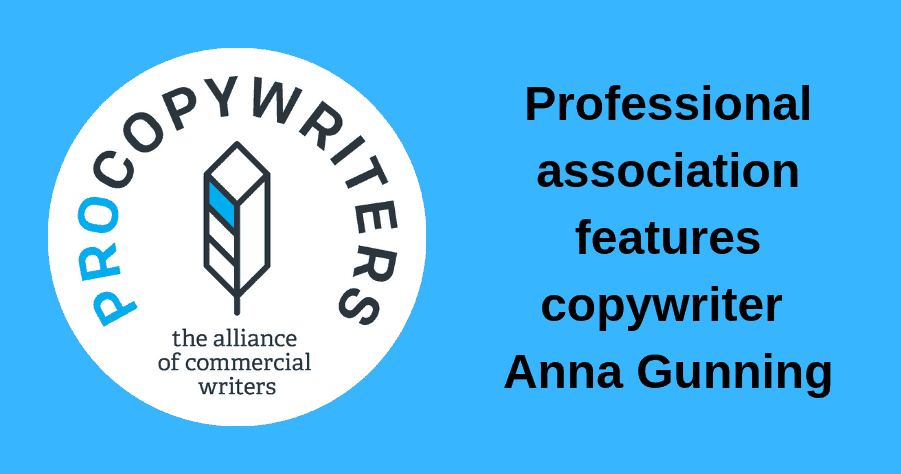MD and Birmingham-based copywriter Anna Gunning was interviewed by ProCopywriters, the professional association for commercial writers.
How has your business changed since your Spotlight interview in 2016??
The business has grown exponentially (a source of great pride). It’s now a small copywriting and content marketing agency working with 30-odd clients a year. I ran the stats the other day, and we’ve grown 93% in the past 2 years.
I’m also doing more speaking and training than I had been. Speaking at the Copywriting Conference – which is one of my favourite industry events – was a real highlight, especially since I was sharing a platform with the likes of Ryan Wallman and Doug Kessler.
What’s been your biggest success since your first Spotlight interview?
Campaigns that have gotten great results. There was one for a software company, where an email campaign got them votes for a prestigious industry award. A letter campaign helped another client diversify its customer base (they had been very dependent on a big contract). A professional association really boosted member engagement…there’s nothing quite like getting that feedback.
I’m also really proud of the volume of business that comes from referrals. I’ve gotten to work with fascinating companies across technology, professional services, property and manufacturing thanks to referrals. That’s so rewarding because people think so highly of you that they’re using you to enhance their reputation.
Why did you decide to focus on the kind of work you’re doing now?
I’ve focused on B2B for 95% of my career, from back when I worked in larger marketing and PR agencies. I wouldn’t have it any other way.
It’s a wonderful feeling – being able to sort through complex decision-making processes and stakeholder motivations. Like solving a complex puzzle. And I do love a good tour of a factory or site.
What are you enjoying most about your niche?
There’s both variety and commonalities across B2B. Writing a white paper about Industry 4.0 is very different to writing a website for a training company.
But as with any copywriting, the fundamentals are the same. Understanding the target audience, understanding where your audience is in the decision-making process – and understanding what messages will resonate. My process is the same, but I apply it to so many areas.
What are you working on just now?
Today I worked on a content marketing and email nurturing campaign for a recruitment agency, a brochure for an architectural practice, a case study for a software company and a strategy for a manufacturing organisation.
Describe your desk and what’s on it, and the view from your window
I have many to-do lists. I have my notebook with meeting notes and my medium-term to-do list, and then post-its with today’s to-dos. Then there’s my computer and a stack of copy waiting to be reviewed.
My view is the best. I’m on the 21st floor of the tallest office building in Birmingham, and I look over regeneration happening alongside iconic buildings like the Town Hall. Birmingham is the place to be, in my humble opinion! Here’s a photo from the window:

Tell us about your side projects
I volunteer for Inspiring the Future, which is an organisation that links schools with professionals to broaden students’ understanding of career opportunities. I go into secondary schools around Birmingham and talk about careers in marketing. Sometimes it’s a career fair, sometimes it’s mock interview, and sometimes I work longer-term alongside BTEC business courses to give a real-life element to the marketing modules.
It’s great fun, and I recommend anyone who loves their job get involved. Marketing in Birmingham has a bright future, I can tell you.
How has your writing process evolved?
I get lots of inspiration from other writers in this regard. For example, Jennifer Havice, in her book Finding the Right Message, has a useful process for capturing the voice of the customer. Andy Maslen, in Persuasive Copywriting, has a handy matrix for fostering emotion in copy. Bernadette Jiwa is great for storytelling structures. I’m a complete Amazon junkie.
I am definitely a methodical, process-driven writer and am always looking for new strategies I can use.
What do you wish copywriters were more honest about?
How much copy improves through feedback. Even when I think I’ve crafted the perfect sentence, I have clients come back and say: ‘What if we tweaked it with XYZ?’ And they’re 100% right.
Yes, copy by committee can turn out horribly – but having fresh eyes can make a world of difference.
What advice do you often hear given to newbies, but you don’t agree with? Why?
You need to write for short attention spans. And that you need to go for the clever, creative angle.
This advice has a place depending on the audience and goal – but relevance is more important than brevity, and clarity trumps cleverness.
Any lessons you’re still learning?
How to write compelling copy! It’s something I work on continuously through conferences, webinars, courses – and of course, analysing campaign results. I never feel I can rest on my laurels.
What’s something about your work that makes your inner copywriting nerd happy, but you’re not able to chat about enough?
Getting people to read the next sentence. Being able to focus on the one job a subject line or headline or hook has – which is to get people to read on.
I love looking at the way copy flows, so the individual components combine to make the reader think and feel differently.

